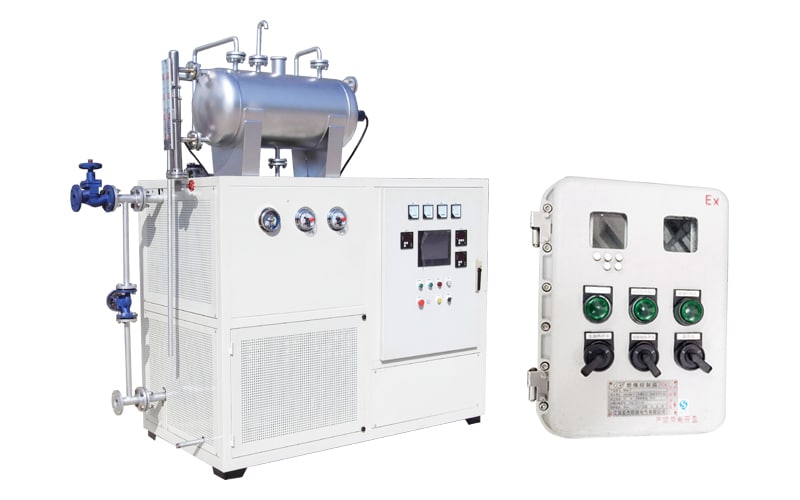
Thermal oil heaters are common thermal energy equipment in industrial production, and their safety has always been a major concern. Many companies are often confused about whether electrically heated thermal oil heaters fall under the category of special equipment and require special regulatory compliance when purchasing and using them. This article provides a detailed analysis of the classification of electrically heated thermal oil heaters under domestic and international regulations to help users correctly understand their regulatory requirements.
1. Classification of Thermal Oil Heaters Under China’s Special Equipment Regulations
According to China’s current Special Equipment Safety Law and the Special Equipment Catalog (2014 revised edition), whether a thermal oil heater is classified as special equipment depends primarily on its design pressure and capacity.
Cases where it is classified as special equipment:
- Pressure-bearing organic heat carrier boilers: Gas-phase organic heat carrier boilers with a designed rated power ≥ 0.1 MW (~86,000 kcal/h).
- Liquid-phase organic heat carrier boilers: Liquid-phase organic heat carrier boilers with a designed rated power ≥ 0.1 MW and an operating temperature ≥ their standard boiling point.
Cases where it is not classified as special equipment:
- Electrically heated thermal oil heaters with a design pressure ≤ 0.1 MPa (gauge pressure) and rated power < 0.1 MW.
- Atmospheric-pressure thermal oil heaters (open to the atmosphere, working pressure ≤ 0.1 MPa).
It is worth noting that in 2022, China’s State Administration for Market Regulation issued a draft revision of the Special Equipment Catalog, proposing to adjust the regulatory threshold for organic heat carrier boilers to “rated thermal power ≥ 0.07 MW,” a change that deserves industry attention.
2. Special Characteristics of Electrically Heated Thermal Oil Heaters
Compared with traditional fuel-fired thermal oil heaters, electrically heated models have the following features:
- Differences in pressure systems: Electrically heated models typically use low-pressure or atmospheric-pressure designs, avoiding the high-pressure risks associated with combustion systems.
- Different heat sources: Direct electric heating eliminates the risk of combustion explosions.
- Control systems: Usually equipped with more comprehensive multi-level safety protections.
Due to these characteristics, low-power electrically heated thermal oil heaters are often excluded from special equipment regulations. However, users should note that electrically heated thermal oil heaters with a power ≥ 0.1 MW are still classified as special equipment and require usage registration, regular inspections, and other compliance procedures.
3. Regulatory Requirements for Thermal Oil Heaters in Europe and the U.S.
ASME Standards (U.S.):
- Classifies organic heat carrier systems into high-pressure (>15 psig, ~0.1 MPa) and low-pressure (≤15 psig) categories.
- High-pressure systems must be designed and manufactured in accordance with boiler and pressure vessel standards.
- Electric heating systems are subject to the same pressure standards rather than heat source type.
EU Pressure Equipment Directive (PED):
- Classifies equipment based on the product of working pressure × volume and medium hazard level.
- Electric heating does not change equipment classification; pressure system characteristics still determine regulation.
- Additional restrictions apply to thermal oil temperature.
International practices indicate that equipment classification is primarily based on pressure system characteristics rather than heating method, which is consistent with China’s current regulations.
4. Key Considerations for Users
- Procurement stage:
- Confirm equipment design parameters (power, working pressure).
- Require suppliers to provide written clarification on whether the equipment is classified as special.
- For special equipment, manufacturers must have the appropriate manufacturing qualifications.
- Installation and operation:
- Special equipment must be registered with local regulatory authorities before installation and use.
- Non-special equipment should still comply with relevant safety standards (e.g., NB/T 47034).
- Establish comprehensive operation and maintenance protocols.
- Regular inspections:
- Special equipment must undergo periodic inspections by certified agencies.
- Non-special equipment should undergo professional inspections every 2–3 years.
5. Industry Development Trends
With technological advancements and increasing safety requirements, the regulation of thermal oil heaters is evolving in the following ways:
- Possible lowering of regulatory thresholds: For example, China may reduce the regulated power threshold from 0.1 MW to 0.07 MW.
- Stricter energy efficiency requirements: Countries are introducing more rigorous energy efficiency standards.
- Intelligent monitoring: IoT technology enables remote monitoring and early warning systems.
6.Get in Touch
Looking for a reliable pyrohttps://8ruiyan.com/en/all-vacuum-cleaning-furnaces/lysis oven supplier? Contact us today to discuss your specific cleaning or thermal processing needs. Our technical team is ready to provide a tailored solution for your business.
👉 [Contact Us Now]
Whatsapp:86-19106101570
wechat:86-19106101570
email:wupeng@cnryan.com
